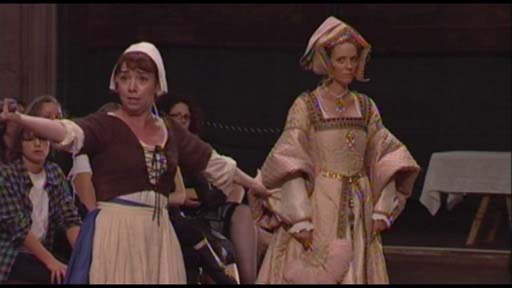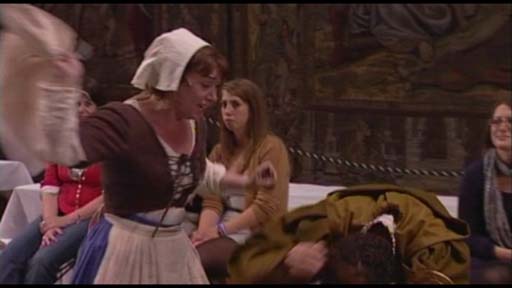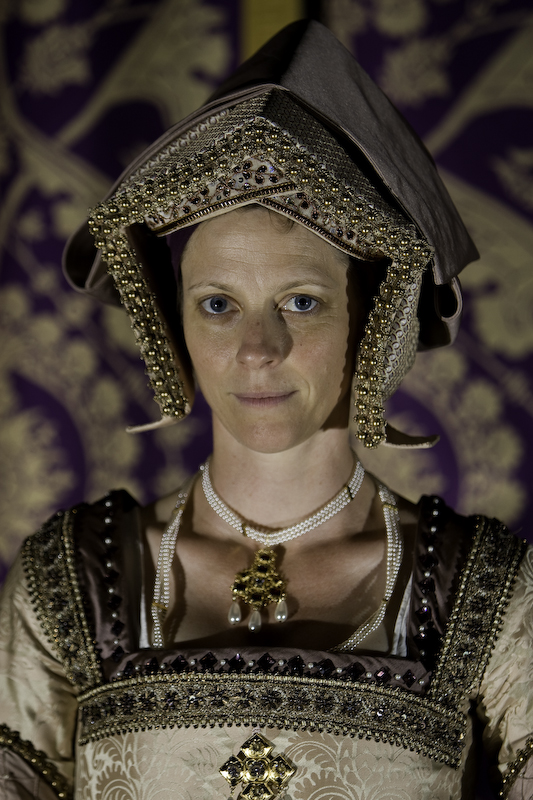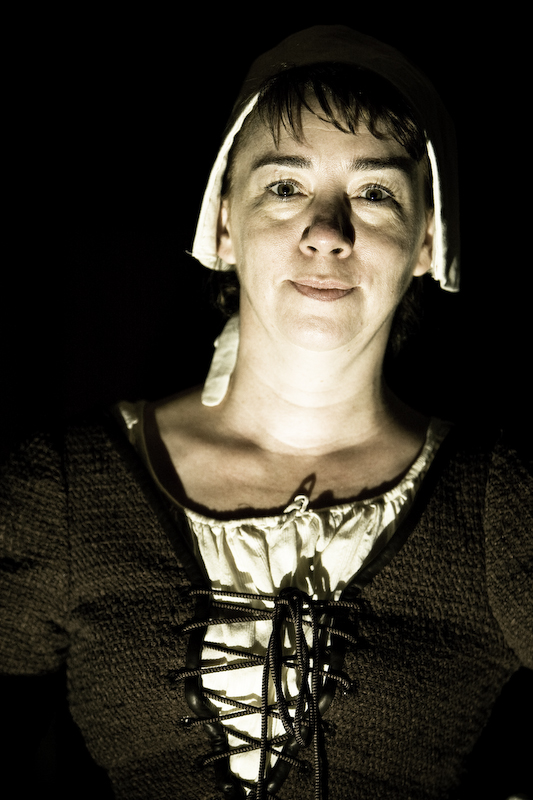It is not thy beauty that I disdain,
But thine idle life that thou hast rehearsed.
913-914
Scene 7 - The Gentlewoman and The Laundress
| The Gentlewoman enters. | |
| Gentlewoman | |
| Now good God, what folly is this! | |
| What should I do where so much people is? | |
| I know not how to pass in to the god now. | |
| Merry Report | |
| No, but ye know how he may pass into you! | |
| Gentlewoman | |
| 770 | I pray you, let me in at the back side. |
| Merry Report | |
| Yea, shall I so, and your foreside so wide? | |
| Nay, not yet! But since ye love to be alone, | |
| We twain will into a corner anon. | |
| But first, I pray you, come your way hither | |
| 775 | And let us twain chat a while together. |
| Gentlewoman | |
| Sir, as to you, I have little matter. | |
| My coming is to speak with Jupiter. | |
| Merry Report | |
| Stand ye still a while, and I will go prove | |
| Whether that the god will be brought in love. | |
| 780 | [To Jupiter] My lord, how now, look up lustily; |
| Here is a darling come, by saint Antony! | |
| And if it be your pleasure to marry, | |
| Speak quickly, for she may not tarry. | |
| In faith I think ye may win her anon, | |
| 785 | For she would speak with your lordship alone. |
| Jupiter | |
| Son, that is not the thing at this time meant. | |
| If her suit concern no cause of our hither resort, | |
| Send her out of place; but if she be bent | |
| To that purpose, hear her and make us report. | |
| Merry Report | |
| 790 | [To the audience] I count women lost, if we love them not well, |
| For ye see god loveth them never a deal. | |
| Mistress, ye can not speak with the god. | |
| Gentlewoman | |
| No, why? | |
| Merry Report | |
| By my faith, for his lordship is right busy | |
| With a piece of work that needs must be done. | |
| 795 | Even now is he making of a new moon: |
| He saith your old moons be so far tasted | |
| That all the goodness of them is wasted; | |
| Which of the great wet hath been most matter, | |
| For old moons be leaky, they can hold no water. | |
| 800 | But for this new moon, I durst lay my gown, |
| Except a few drops at her going down, | |
| Ye get no rain till her arising, | |
| Without it need, and then no mans devising | |
| Could wish the fashion of rain to be so good: | |
| 805 | Not gushing out like gutters of Noah’s flood, |
| But small drops sprinkling softly on the ground: | |
| Though they fell on a sponge, they would give no sound. | |
| This new moon shall make a thing spring more in this while | |
| Then a old moon shall while a man may go a mile. | |
| 810 | By that time the god hath all made an end |
| Ye shall se how the weather will amend. | |
| By Saint Anne, he goeth to work even boldly! | |
| I think him wise enough, for he looketh oldly. | |
| Wherefore mistress, be ye now of good cheer, | |
| 815 | For, though in his presence he can not appear, |
| Tell me your mater and let me alone: | |
| May hap I will think on you when you be gone. | |
| Gentlewoman | |
| Forsooth the cause of my coming is this: | |
| I am a woman right fair, as ye see, | |
| 820 | In no creature more beauty then in me is, |
| And, since I am fair, fair would I keep me. | |
| But the sun in summer so sore doth burn me, | |
| In winter the wind on every side me, | |
| No part of the year woot I where to turn me, | |
| 825 | But even in my house am I fain to hide me. |
| And so do all other that beauty have, | |
| In whose name at this time this suit I make, | |
| Beseeching Jupiter to gaunt that I crave, | |
| Which is this: that it may please him, for our sake, | |
| 830 | To send us weather close and temperate, |
| No sunshine, no frost, nor no wind to blow. | |
| Then would we jet the streets trim as a parrot; | |
| Ye should see how we would set our self to show. | |
| Merry Report | |
| Jet where ye will, I swear by Saint Quentin, | |
| 835 | Ye pass them all both in your own conceit and mine. |
| Gentleman | |
| If we had weather to walk at our pleasure, | |
| Our lives would be merry out of measure: | |
| One part of the day for our apparelling, | |
| Another part for eating and drinking, | |
| 840 | And all the rest in streets to be walking, |
| Or in the house to pass time with talking. | |
| Merry Report | |
| When serve ye God? | |
| Gentleman | |
| Who boasteth in virtue are but daws. | |
| Merry Report | |
| Ye do the better, namely since there is no cause. | |
| How spends ye the night? | |
| Gentleman | |
| In dancing and singing | |
| 845 | Till midnight, and then fall to sleeping. |
| Merry Report | |
| Why, sweet heart, by your false faith, can ye sing? | |
| Gentleman | |
| Nay nay, but I love it above all thing. | |
| Merry Report | |
| Now, by my troth, for the love that I owe you, | |
| You shall hear what pleasure I can show you. | |
| 850 | One song have I for you, such as it is, |
| And if it were better, ye should have it, by gys! | |
| Gentleman | |
| Mary sir, I thank you even heartily. | |
| Merry Report | |
| Come on, sirs, but now let us sing lustily. | |
| Here they sing. | |
| Gentleman | |
| Sir, this is well done, I heartily thank you. | |
| 855 | Ye have done me pleasure, I make God a vow. |
| Once in a night I long for such a fit, | |
| For long time have I been brought up in it. | |
| Merry Report | |
| Oft time it is seen both in court and town, | |
| Long be women a bringing up and soon brought down. | |
| 860 | So fete it is, so neat it is, so nice it is, |
| So trick it is, so quick it is, so wise it is! | |
| I fear my self, except I may entreat her, | |
| I am so far in love I shall forget her. | |
| Now good mistress, I pray you let me kiss ye. | |
| Gentleman | |
| 865 | ‘Kiss me’, quoth a! Why nay, sir, I wys ye! |
| Merry Report | |
| What, yes, hardily, kiss me once and no more. | |
| I never desired to kiss you before. | |
| Here the Launder comes in. | |
| Launder | |
| Why, have ye always kissed her behind? | |
| In faith good enough if it be your mind. | |
| 870 | And if your appetite serve you so to do, |
| Byr Lady, I would ye had kissed mine arse too! | |
| Merry Report | |
| To whom dost thou speak, foul whore, canst thou tell? | |
| Launder | |
| Nay, by my troth, I sir? Not very well. | |
| But by conjecture this guess I have, | |
| 875 | That I do speak to an old bawdy knave. |
| I saw you dally with your simper de cocket; | |
| I rede you beware she pick not your pocket. | |
| Such idle housewifes do now and than | |
| Think all well won that they pick from a man. | |
| 880 | Yet such of some men shall have more favour |
| Then we that for them daily toil and labour. | |
| But I trust the god will be so indifferent. | |
| That she shall fail some part of her intent. | |
| Merry Report | |
| No doubt he will deal so graciously | |
| 885 | That all folk shall be served indifferently. |
| How be it, I tell the truth, my office is such | |
| That I must report each suit, little or much. | |
| Wherefore, with the god since thou canst not speak, | |
| Trust me with thy suit, I will not fail it to break. | |
| Launder | |
| 890 | Then lean not too much to yonder giglet, |
| For her desire contrary to mine is set. | |
| I heard by her tale she would banish the sun, | |
| And then were we poor launders all undone. | |
| Except the sun shine that our clothes may dry, | |
| 895 | We can do no right nought in our laundry; |
| Another manner loss if we should miss | |
| Then of such nicebyceters as she is. | |
| Gentleman | |
| I think it better that thou envy me | |
| Then I should stand at reward of thy pity. | |
| 900 | It is the guise of such gross queens as thou art |
| With such as I am evermore to thwart | |
| Because that no beauty ye can obtain | |
| Therefore ye have us that be fair in disdain. | |
| Launder | |
| When I was young as thou art now, | |
| 905 | I was within little as fair as thou, |
| And so might have kept me, if I had would, | |
| And as dearly my youth I might have sold | |
| As the trickest and fairest of you all. | |
| But I feared perils that after might fall, | |
| 910 | Wherefore some business I did me provide |
| Lest vice might enter on every side, | |
| Which hath free entry where idleness doth reign. | |
| It is not thy beauty that I disdain, | |
| But thine idle life that thou hast rehearsed, | |
| 915 | Which any good woman’s heart would have pierced. |
| For I perceive in dancing and singing, | |
| In eating and drinking, and thine apparelling, | |
| Is all the joy wherein thy heart is set. | |
| But nought of all this doth thine own labour get. | |
| 920 | For haddest thou nothing but of thine own travail, |
| Thou mightest go as naked as my nail. | |
| Me think thou shouldest abhor such idleness | |
| And pass thy time in some honest business. | |
| Better to lose some part of thy beauty | |
| 925 | Then so oft to jeoperd all thine honesty. |
| But I think, rather then thou wouldest so do, | |
| Thou haddest lever have us live idly to. | |
| And so, no doubt, we should, if thou mightest have | |
| The clear sun banished, as thou dost crave. | |
| 930 | Then were we launders marred, and unto thee |
| Thine own request were small commodity. | |
| For of these twain I think it far better | |
| Thy face were sun burned and thy clothes the sweeter, | |
| Then that the sun from shining should be smitten | |
| 935 | To keep thy face fair and thy smock beshitten. |
| Sir, how like ye my reason in her case? | |
| Merry Report | |
| Such a railing whore, by the holy Mass, | |
| I never heard in all my life till now! | |
| In deed I love right well the one of you, | |
| 940 | But, or I would keep you both, by God's mother, |
| The Devil shall have the one to fet the tother! | |
| Launder | |
| Promise me to speak that the sun may shine bright, | |
| And I will be gone quickly for all night. | |
| Merry Report | |
| Get you both hence, I pray you heartily. | |
| 945 | Your suits I perceive and will report them truly |
| Unto Jupiter at the next leisure, | |
| And, in the same, desire to know his pleasure; | |
| Which knowledge had, even as he doth show it, | |
| Fear ye not, time enough ye shall know it. | |
| Gentleman | |
| 950 | Sir, if ye meddle, remember me first. |
| Launder | |
| Then in this meddling my part shall be the worst. | |
| Merry Report | |
| Now I beseech Our Lord, the Devil the[e] burst! | |
| Who meddleth with many, I hold him accurst. | |
| Thou whore, can I meddle with you both at once? | |
| Here the gentlewoman goes forth. | |
| Launder | |
| 955 | By the Mass, knave, I would I had both thy stones |
| In my purse if thou meddle not indifferently, | |
| That both our matters in issue may be likely. | |
| Merry Report | |
| Many words, little matter, and to no purpose, | |
| Such is the effect that thou dost disclose. | |
| 960 | The more ye bib, the more ye babble, |
| The more ye babble, the more ye fable, | |
| The more ye fable, the more unstable, | |
| The more unstable, the more unable, | |
| In any manner thing to do any good. | |
| 965 | No hurt though ye were hanged, by the holy Rood! |
| Launder | |
| The less your silence, the less your credence, | |
| The less your credence, the less your honesty, | |
| The less your honesty, the less your assistance, | |
| The less your assistance, the less ability | |
| 970 | In you to do ought. Wherefore, so God me save, |
| No hurt in hanging such a railing knave! | |
| Merry Report | |
| What monster is this? I never heard none such. | |
| For look how much more I have made her too much, | |
| And so far at least she hath made me too little. | |
| 975 | Where be ye launder? I think in some spittle. |
| Ye shall wash me no gear for fear of fretting. | |
| I love no launders that shrink my gear in wetting. | |
| I pray thee, go hence and let me be in rest. | |
| I will do thine errand as I think best. | |
| Launder | |
| 980 | Now would I take my leave, if I wist how. |
| The longer I live the more knave you! [Exit.] | |
| Merry Report | |
| The longer thou livest, the pity the greater, | |
| The sooner thou be rid, the tidings the better! | |
| Is not this a sweet office that I have, | |
| 985 | When every drab shall prove me a knave? |
| Every man knoweth not what god’s service is, | |
| Nor I my self knew it not before this. | |
| I think god's servants may live holily | |
| But the Devil’s servants live more merrily. | |
| 990 | I know not what god giveth in standing fees, |
| But the Devil’s servants have casualties | |
| A hundred times more then god’s servants have. | |
| For, though ye be never so stark a knave, | |
| If ye lack money the Devil will do no worse | |
| 995 | But bring you straight to another mans purse. |
| Then will the Devil promote you here in this world | |
| As unto such rich it doth most accord. | |
| First, ‘pater noster qui es in celis’, | |
| And then ye shall cense the sheriff with your heels. | |
| 1000 | The greatest friend ye have in field or town, |
| Standing a tip-toe shall not reach your crown. | |
The first woman to enter the play is The Gentlewoman, who desires access to Jupiter in order to sue for temperate weather which will maintain her fair beauty. The scene contains one of the most politically charged moments in the play - the so-called 'new moon speech' which appears to reference Henry VIII's Great Matter, but in excessively sexual terms. The Laundress enters while Merry Report is flirting with The Gentlewoman and worries that her own appeal for sunny weather to help her dry her clothes will not be heard because of Merry Report's attraction towards the other female. The two women argue about the relationship between femininity, labour and virtue in very interesting terms, until Merry Report eventually drives them both from the stage with his licentiousness.
Key Research Topic
Gender, Performance and the Court |
|
 |
The historical evidence for female performance at court is explored, alongside the representation of femininity and class difference in the Play of the Weather. |
Historical Context
The Tunning of Elinor Rumming |
|
 |
This poem by John Skelton provides useful insight into the representation of ageing women who run their own businesses during the early sixteenth century. |
Guystarde and Sygysmonde on Idleness |
|
 |
Whilst this is a conventional piece of Tudor chivalric poetry, Robert Copland’s preface to the translator is noticeable because it presents the poem as a moral tale rather then emphasising the courtly aspect. |
Resources
 |
 |
 |










